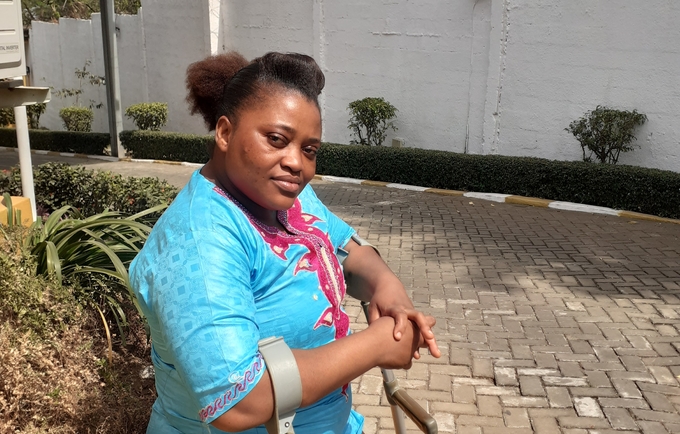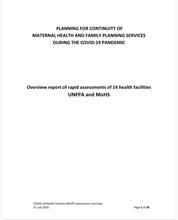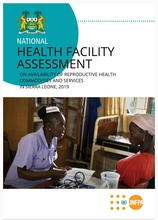FREETOWN, Sierra Leone, 10 January 2020 – In 2019, UNFPA supported the National Secretariat for the Reduction of Teenage Pregnancy in establishing a youth advisory panel consisting of 16 youth champions passionate about reducing teenage pregnancy and ending child marriage. Funded by Irish Aid, the youth advisory panel is tasked with advising the Government on the gaps preventing adolescents from accessing sexual and reproductive health services and information. UNFPA met up with Salimatu, one of the disabled youth advisory panel members, whose life experiences and sheer passion to be a role model illustrates why she was chosen as a panel member.
When Salimatu from Moyamba district was just four, she was treated at a local hospital for a high fever which left her mobility impaired and required her to use crutches. “At the time, members in my community called me an ‘evil child’ who had been cursed by witchcraft, upon seeing my weakened leg,” recalled Salimatu with a brave smile. At eight, Salimatu moved to Freetown where she lived with her adoptive father in a rented house. However, when she was 15 years old, she was hit with another tragedy, the passing of her father. It left Salimatu homeless and unable to continue her studies.
Challenging times
“It was very challenging for me at this time,” explained Salimatu. “I had challenges with accommodation, I couldn’t afford to pay my school fees and wasn’t able to sit my exams.” She found a derelict building in the heart of the capital, Freetown, where she lived with over 120 other disabled men and women. There, she met a man who agreed to financially support her studies in exchange for sexual favours. With no knowledge of family planning, Salimatu became pregnant at the age of 16.
Salimatu is one among the 28 per cent of adolescents aged 15 to 19 who have begun childbearing in Sierra Leone. They are at a high risk of maternal mortality and morbidity: 47 per cent of female deaths amongst adolescents are maternal deaths. One in six women aged 20–49 are married by the age of 15.
Teenage mother
After giving birth to a baby girl, Salimatu started begging on the streets to pay for food and to look after her daughter. After saving enough money to buy supplies, Salimatu began selling sweets and chocolates to local pedestrians for seven years.
At 23, she pursued funding for the education she desperately wanted to continue, and was granted 400,000 Leones by a local disability foundation and 500,000 Leones by an online gaming company. Two years later, Salimatu graduated with a certificate from a secretarial course.
Singing to promote awareness
In 2013, Salimatu completed a three-month internship at OneFamilyPeople, an organization that provides impact-oriented services for persons with disabilities, their families and their communities. Wowed by her singing talents, the staff at OneFamilyPeople helped Salimatu establish The Great Walpoleans Band, which delivers advocacy messages on disability rights through their songs. “At OneFamilyPeople, I learned that disabled people are important in society and that we can participate at all levels,” said Salimatu. “Before I didn’t think I was important. But now through my singing, people know what I’m fighting to achieve.”
As the lead singer in the band of 24 people, including able-bodied and disabled members, Salimatu has travelled to districts across the country, raising awareness on issues dear to her heart such as reducing teenage pregnancy and ending child marriage. Now Salimatu works as a Field Officer at OneFamilyPeople, providing outreach services such as life skills to adolescents aged 12–18 years in deprived communities in Western Freetown Urban. “I work in areas where there is not much knowledge of sexual and reproductive health and rights and information in the communities,” explained Salimatu. “I work in partnership with various community stakeholders including, parents, religious leaders, the police, nurses and others to collectively address the issues faced by young people, especially girls.”
Youth champion
In July 2019, recognizing Salimatu’s passion and drive, her manager informed her about the call for applications for people with disabilities for the UNFPA Youth Advisory Panel. Salimatu submitted her application, was interviewed, and a month later notified that she was successful.
In September 2019, she participated in a five-day orientation training with other newly recruited Youth Advisory Panel members. “The training made me understand that disability is not inability,” she said. “I found the training on leadership, gender and communications very important. Because when you go out into the communities and work with young people, both parties need to understand each other. If I’m able to communicate, then I’m able to become a leader.”
Salimatu now attends high-level multi-sectoral meetings chaired by the National Secretariat for the Reduction of Teenage Pregnancy to advise Government ministries and its partners. She has worked closely with the National Secretariat to revise their communication strategy; organized community meetings in Western Area Urban; counselled adolescent girls on the importance of staying in school during the holidays and helped organize a sexual and reproductive health community event for around 80 adolescent boys and girls.
Looking ahead
Now living with her ten-year-old daughter in her own private residence, Salimatu has big dreams for the future. “I really want to develop different structures for adolescent groups such as Girls Clubs to be held on Saturdays. At these clubs, girls could learn about managing money, being healthy, being confident, assertive and valuing themselves as girls. I also want to work with primary and secondary schools to engage adolescents on sexual and reproductive health and rights.” We have no doubt that she will achieve her set goals. With her drive and commitment, she is an inspiration to everyone she meets.
***
For more information, please contact:
Angelique Reid, UNFPA Sierra Leone, Communications Specialist
Tel: +232 78340044 - Email: areid@unfpa.org



